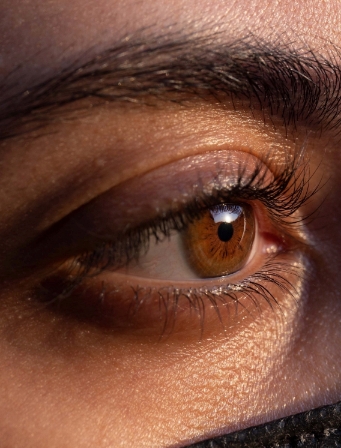USEFUL EYECARE TIPS
Are you unknowingly harming
your eyes?
Here are some tips on how to pamper your eyes!
EYE CHECK-UPS

Is Regular Eye Check-Up a Must?
As we age, the eye becomes more susceptible to damage, dry eyes and diseases. A visit to an eye doctor serves as a preventive maintenance and enables early discovery of issues and corrective measures to be taken.
They enable blood vessels to be examined in a natural
state without any surgical procedure. Being alert to changes in the vision or the eyes is important and may even allow diseases to be identified early.
They include:
- Cataract
- Glaucoma
- Liver issues
- Macular degeneration
- Diabetes
- High blood pressure
- High cholesterol
So how often should this be?
Age
Recommended Interval
Less than 3 years old
During regular paediatric consultation
3 to 19 years old
Every year
20 to 39 years old
Have a comprehensive eye examination if you have a family
history of eye disease or if you are suffering from an eye injury
40 to 64 years old
Get a baseline screening at 40 years old and consult the doctor on the follow-up intervals
Age
Recommended Interval
Less than 3 years old
During regular paediatric consultation
3 to 19 years old
Every year
20 to 39 years old
Have a comprehensive eye examination if you have a family
history of eye disease or if you are suffering from an eye injury
40 to 64 years old
Get a baseline screening at 40 years old and consult the doctor on the follow-up intervals
If you experience dry eyes, keep a lookout for the triggers and avoid them! When your eyes talk, listen to them.
EYE CARE TIPS

Useful Eye Care Tips
Eyes are the window to your soul. By taking good care of your eyes, you will reduce the odds of vision issues.
These are habits you can adopt to maintain your eye health and vision:
- Give your eye a break in between prolonged staring of screens. If you stare at the screens for too long, you often tend to forget to blink. This can lead to evaporation of moisture from the ocular surface and eye strain. Remember the 20-20-20 rule: Take a quick break every 20 minutes and look away from your screen. During the break, look at an object at least 20 feet away. Focus on the object for at least 20 seconds before returning to your screen.
- Exercise regularly, if possible 30 minutes everyday. Exercise helps to keep you healthy and reduces the risk of diabetes, high cholesterol and high blood pressure, all of which can lead to vision problems.
- Eat a balanced meal. This should include fruits, vegetables, lean meat and whole grains.
- Wear sunglasses to protect your eye from UV rays. UV rays increase the risk of cataracts and macular degeneration. It is important to choose the correct pair of sunglasses that blocks out both UVA and UVB rays.
- Wear blue light glasses to reduce eye strain. Blue light emitted from screens can lead to glare and worsen eye strain. Overtime, prolonged exposure to blue light can also lead to damaged retinal cells.
- Get adequate sleep of 6-8 hours. Insufficient sleep may cause the eyes to be more sensitive to light, dry eyes or result in a blurry vision. Overtime, it can also lead to
more severe issues like glaucoma. - Practice good hygiene when wearing contact lenses. Wash your hands well before putting on or removing your contact lenses. Replace the contact lens case regularly, every 3 months to avoid bacterial contamination and keratitis (inflammation of the cornea).
DIGITAL DEVICES

How do Digital Devices Affect Our Eyes?
In a digital age, staring at the screen for a prolonged period is often inevitable and too much screen time is a common pitfall.
Research found that prolonged screen time has a low chance of permanent vision damage. Although using a digital device will not harm your eyes, staring at a screen for a prolonged period will contribute to eye strain, tired eyes or dry eyes.
When you are too focused on staring at your screen, you may forget to blink or blink your eyes less often. This speeds up the rate of evaporation of the tear film that protects your ocular surface, causing eye irritation, burning, stinging, dry eyes, red eyes or itchy eyes.
This can inadvertently affect your ability to focus your vision and reduce work productivity. Vision care is of utmost importance to reduce eye strain especially in the digital age. Certain tips of vision care include:
20-20-20 rule where for every 20 minutes of staring, look away for 20 seconds and focus on an object 20 feet away.
Use blue light glasses to minimize screen glare.
Maintain an arm’s length between your eyes and the screen.
Adjust the brightness of the screen to a level comfortable for your eyes.
Increase font size on screen for easier viewing and to minimize squinting.
Use artificial tears to relieve dry eye symptoms and soothe the eyes
These simple actions can be incorporated into your daily life and they go a long way to maintain and protect your eye health.
AIR-CONDITIONING

Can Air-Conditioning Ruin Our Eyes?
With the sun beating down relentlessly, people often turn to switching on the air-conditioner to cool themselves down and create a more comfortable and conducive environment to stay in. While air-conditions provide us this relief, most of us are unaware of how this can actually harm our health, especially our eyes.
The blowing air from an air-conditioner can increase the rate of evaporation of tear film of the eyes, reducing moisture of the eyes and causing dry eyes. Furthermore, as the temperature drops, the meibomian gland is less able to function properly and secretes less oil. The oil supposedly helps to trap moisture and prevent the tear film from evaporating too quickly.
However, with insufficient oil, the tear film now breaks down at a much faster rate, further contributing to dry eyes.
Dryness of the eyes can lead to blurred vision and difficulty focusing. In the long run, if not treated, dry eyes can lead to chronic inflammation, abrasion of the corneal surface and ultimately, vision loss.
If you want to avoid these harmful effects, start taking care of your eyes today. Precautions can be taken to minimise the impact of air-conditioner on your eyes and they include:
Adjust the vanes such that the air does not blow directly into your eyes
Do not sit too close to the air-conditioner
Invest in a humidifier which retains moisture in the air
Avoid prolonged usage of air-conditioners
Maintain room temperature of about 23 degree Celsius
If you are suffering from dry eyes, seek treatment early and start taking the precautionary steps today!